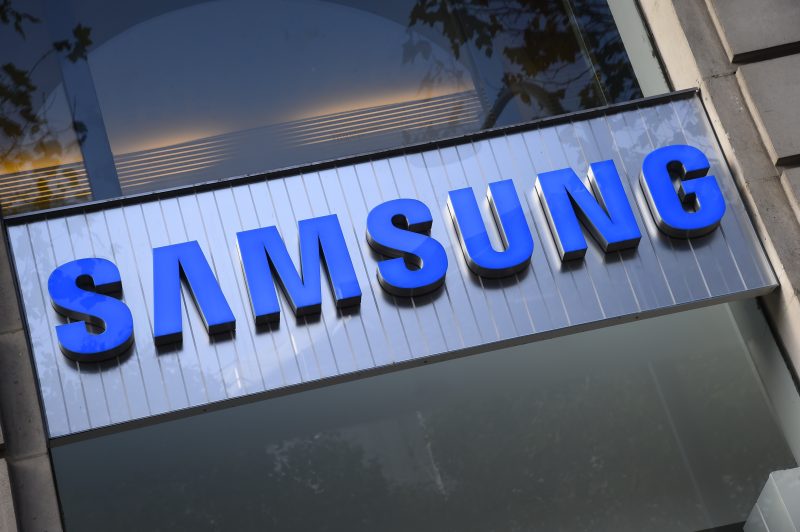Samsung could end up in French court over ethics pledges: NGOs
Samsung may end up in hot water in France for failing to live up to its corporate ethics policies (BERTRAND GUAY)
Paris (AFP) – Samsung Electronics could end up in the dock in France for not abiding by its own ethics pledges, such as a ban on under-age labour and dangerous working conditions at its factories, two NGOs said on Wednesday.
A complaint filed against the French subsidiary of the smarthphone giant by activist groups Sherpa and ActionAid France – Peuples Solidaires, has led an investigating magistrate in Paris to filing preliminary charges, they said.
Accused by various NGOs of violating human rights at some of its factories in China, South Korea and Vietnam, the two French pressure groups said the actions amount to a breach of the pledges that Samsung makes on its website.
The NGOs argue that such pledges are just as legally binding as a company’s marketing practices and that Samsung is in violation of them.
“This is the first time in France that it was recognised that corporate ethics pledges may be considered marketing practices that are binding on a firm,” the activist groups said in a statement.
The NGOs originally filed their complaint a year ago, but the investigating magistrate in Paris has now decided to pursue the case after quizzing an executive of Samsung France, the statement said.
Based on information provided by other rights groups such as China Labor Watch, the NGOs allege that Samsung employs children under the legal of 16, subjects its employees to abusive working hours, that housing and labour conditions fail to meet basic conditions of human dignity and put workers in danger.
Similar complaints by activists have been dismissed by prosecutors in the past, so they have filed it directly to an investigating magistrate this time to get around that. The filing of preliminary charges does not mean the case will reach trial.
Samsung wasn’t immediately available for comment.
– Human rights violations? –
The plaintiffs argue that because the ethics pledges are easily readable on Samsung’s website by French consumers, the French judiciary is competent to handle the case and issue a ruling.
On its website, Samsung declares that in addition to complying with local laws and regulations, it is also committed to applying a strict global code of conduct and practicing ethical management.
“We respect the basic human rights of all people. Forced labour, wage exploitation and child slavery are not allowed under any circumstances,” the pledge states.
Sherpa and ActionAid say that, according to evidence gathered by China Labor Watch, there were a number of human rights violations at 11 factories in China, South Korea and Vietnam making Samsung products between August 2012 and December 2014.
These included the use of under-age labour at wages 30 percent below those paid to other workers.
The plaintiffs also complained that employers worked with dangerous substances, often without adequate protection.
In South Korea, for example, workers were not informed that they were working with methanol, a substance that can cause brain damage, blindness of even death.
At the hearing by the Paris investigating magistrate in April, Samsung’s representative Renaud Van Ruymbeke contested the allegation made in one of China Labor Watch report’s from 2012 that under-age children were employed in China.
– ‘Certain deviations’ –
Nevertheless, according to a source with knowledge of the matter, Van Ruymbeke conceded that Samsung’s own investigation had found “certain deviations” from labour regulations at its Chinese sub-contractor, HEG.
The Samsung represenative also challenged the use of the term “poisoning” with regard to methanol, stating that no “causality” had been proven between the chemicals used and the diseases affecting certain workers, the source said.
Nevertheless, Samsung, which booked annual turnover of $219 billion in 2018, has been ordered to compensate several South Korean employees following a ruling by a court of arbitration.
And in November last year, Samsung’s co-president Kim Ki-nam made a formal apology to workers who developed cancer after working at the group’s factories, ending a decade-long dispute.
The decision in France to pursue possible charges “gives hope for all the workers in multinational production chains who should see their conditions improve since companies will have to respect their ethical commitments,” Marie-Laure Guislain of Sherpa told AFP.
She hoped the decision would mark “a real turning point towards making globalisation more just and fair.”
Sherpa is calling for an international treaty binding multinationals to respect human rights throughout their production chain.
Disclaimer: Validity of the above story is for 7 Days from original date of publishing. Source: AFP.


